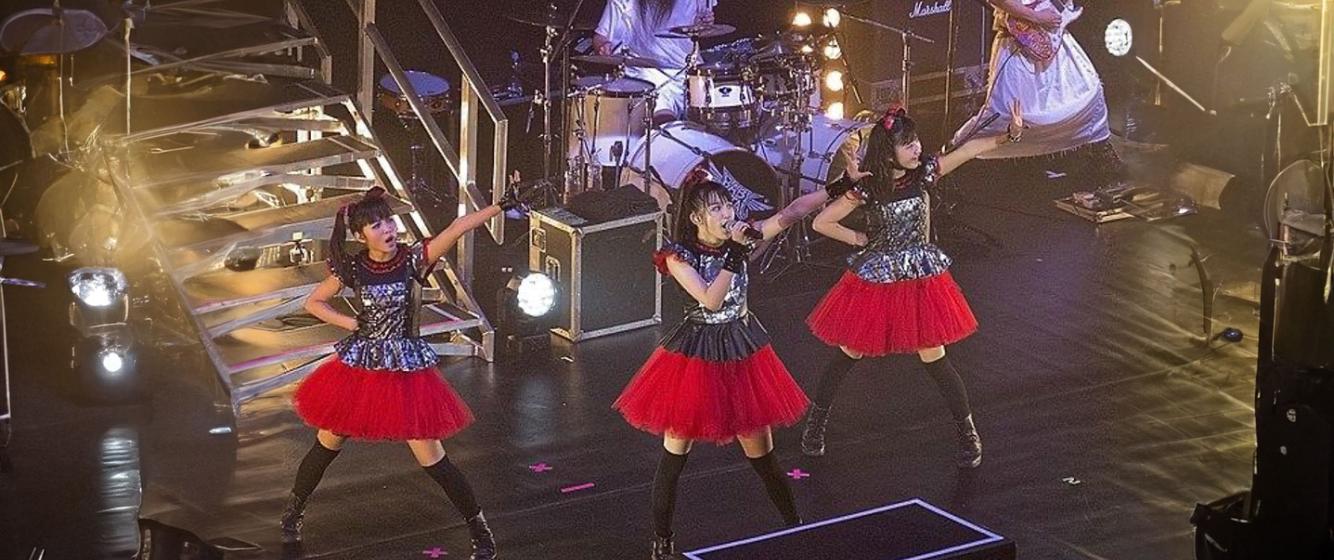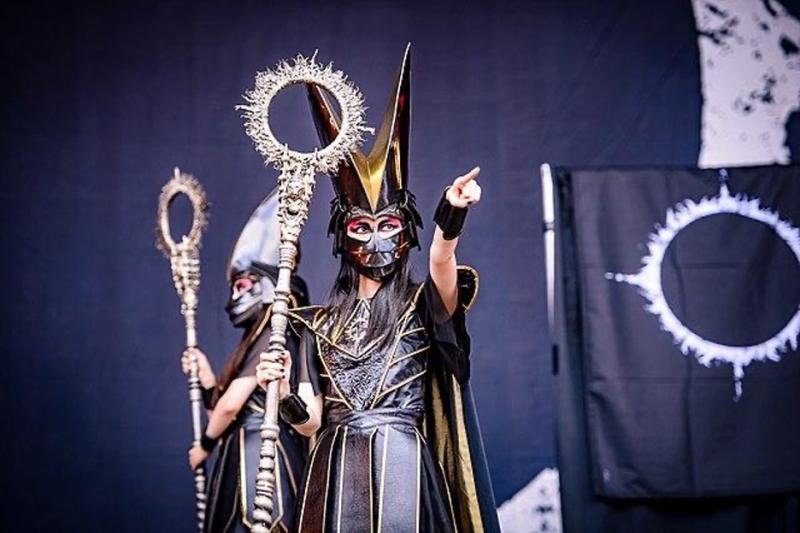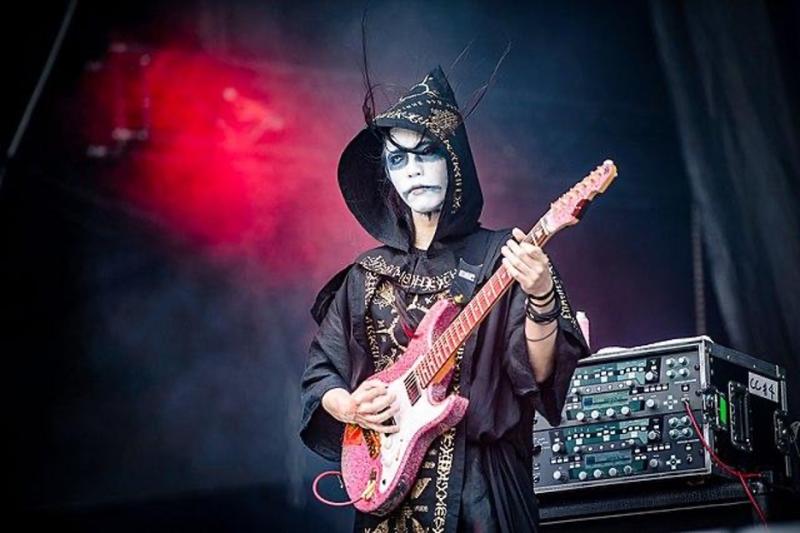
Babymetal performing in London, November 2014. From left to right; Moametal, Su-metal and Yuimetal. Fuguito. Creative Commons Attribution-Share Alike 3.0
Baby Metal: Musical Entrepreneurs
Imagine if you will, a video of three young teen girls, two in pigtails. They are all dressed in black tops that mimic leather, long black stockings, and red chiffon skirts. They stand in front of a large bust, probably of Kanno/Guanyin, a Bodhisattva, but vaguely reminiscent of Christian figures like Jesus or Mary. The center girl raises her fist, and the band you had not noticed yet, backstage left, dressed head to foot in skeleton costumes, drops into a heavy metal jam that shakes the rafters. The three girls, Yui Metal and Moa Metal on either side, who are of a height and look like they could be twins, and Su Metal in the center, the tallest, oldest, and wearing a ponytail, begin to jump to the rhythm while raising their fists. The music is raucous, and the mosh pits on either side of the stage fill with rushing, jumping metal fans. Su Metal, in a powerful voice that resonates far beyond her 15 years, begins to sing an anthem to … chocolate. This is the beginning of the live version of “Gimme Chocolate,” Baby Metal’s powerful entry into the genre of Heavy Metal. Or is it Idol Pop? Or is it Idol Heavy Metal Pop?
In September I posted about AKB48 and the way that Japanese Idol Music is designed specifically for the Japanese market. But music markets are never static. They change all the time. Often when there is a closed system, new acts will find a way to get the public attention. This is the story of BabyMetal’s success at doing just that.
What is BabyMetal? Three Japanese girls, now in their early 20s, but when they began aged 13-15, dressed in black leather, black leggings, and red chiffon skirts, wearing their hair in pigtails. BabyMetal is beguiling, showstopping, and mischievous. The girls are backed up by a crack heavy metal group known as the Kami Band who dress in costumes. Their symbol is the fox god - a play on a creepy Japanese superstition. And they ROCK. Their songs are an astonishing synthesis of heavy metal and Japanese Idol pop. One of their first multi-million-view videos, for example, was a guitar-riff-heavy speed-metal anthem called “Headbanger”. Lest you confuse them for exclusively cute, however, another popular tune, and my favorite, is called “Sis Anger,” performed by Black Baby Metal - the two younger girls without Su Metal. The resentment and anger lift you out of your seat. When BabyMetal jumped into the global metal scene in 2010 their songs caused controversy, confusion, and instant popularity worldwide. Their story is the story of innovation in Japan’s popular music business.
Business was at the center of BabyMetal. The cognitive dissonance caused when three cute girls fronted a heavy metal band to sing about a chocolate craving was jarring. Kobayashi Kei of Amuse Entertainment, Inc., producer of BabyMetal, and publicly known by his pseudonym Koba Metal, has said that his goal was to find a way into the lucrative idol pop market. He needed a gimmick, and he came up with BabyMetal. Koba Metal measures success in dollars, pounds, and yen, and these days, he almost has to weigh rather than count his currency. BabyMetal became the first Japanese band to headline at London’s New Wembley Stadium in 2016, where they played to an audience of 12,000 people, and broke records for souvenir sales. In 2017 they opened for The Red Hot Chili Peppers, Metallica, and Guns ‘n Roses, and performed as headliners on June 16 in Los Angeles. They are currently in the midst of a 2023 world tour, having just finished with a performance at Japan’s Summer Sonic Music Festival in front of thousands of screaming fans. The question is, why and how did BabyMetal work?

'Rock im Park 2018; Zeppelinfeld Nürnberg': 'Baby Metal'
Marty Friedman, guitarist for the 80s and 90s thrash metal band Megadeath is a fan of BabyMetal. More importantly, he knows the global Heavy Metal music market and is under no illusions that the music business is a business. When asked about BabyMetal during a radio interview in Argentina, Friedman told his hosts that combining pop idol singers and heavy metal makes perfect sense in Japan, where traditional heavy metal doesn't sell, but idols do. Moreover, according to Friedman, many idol music producers are "secret heavy metal fans," who often write metal guitar riffs and beats for their own entertainment. The combination was natural, said Friedman.
On July 25, 2015, Friedman talked on Asia-Mus23M with Taiwanese heavy metal band Chthonic (read Sonic) lead vocalist Freddy Lim about the phenomenon of combining idols with heavy metal. Lim and Friedman noticed some connections between heavy metal and Japanese idol music that suggested the two genres might mix. First is what in idol music is called “ai no te.” This is essentially a break in a song during which the audience can show their love of the music and the performer by joining in the performance. In Idol concerts ai no te is built into songs, and fans perform intricate pre-determined body movements, sometimes chant parts of the song's primary hook, and often raise their arms rhythmically while holding glow sticks. In Metal songs, rhythmic hand movements are common, and Lim says that each song has built into it the opportunity for the audience to jump around, join the mosh pit, or sing along to their favorite hook. Likewise, In metal and idol songs alike, the melody is very strong with a simple structure. In idol songs, the melody is carried by the singers. These two similarities make it possible to combine metal and idol music.
BabyMetal did not fall into the Japanese music market as a completely new thing. Many music producers are Heavy Metal fans, and idol groups including Momoiro CloverZ, who worked with U.S. rockers KISS, have been using metal elements for some time. The fact that BabyMetal has become a global metal sensation is the real difference. BabyMetal appears to be at the globalized end of a long chain of market-oriented adjustments to the idol music scene as new female idol groups searched for market access in the shadow of the power of AKB48. As a producer looking for a new hook to draw in new listeners, BabyMetal producer Koba Metal began his work at the band's management agency (Amuse, Inc.) in the 1980s. Having seen other bands rise and fall, he built a strategy that seems to focus on two key goals: creating a large audience and maximizing the long-term popularity of the band. Kobametal's strategy is a very clear example of an entrepreneurial approach to popular music.

'Rock im Park 2018; Zeppelinfeld Nürnberg': 'Baby Metal'
Having studied the idol phenomenon, Kobametal says that idols create large fan bases very quickly. The audience growth curve can be so steep that the degree of talent and professionalism that an act brings to the table, he says, can become lost in the fury of growing popularity. Since this kind of growth was what he was after in order to build profitability, he recognized that some idol characteristics were necessary for BabyMetal, including the recruitment of cute performers.
To meet the goal of market longevity, Kobametal says "it won’t last long only with cuteness. All long-time survivors do have something special – a solid backbone. Something legit must have been essential, I thought at the time, so in addition to appearance, singing and dancing quality were must-have." Like any good entrepreneurial venture, BabyMetal was more than an entertainment idea. The "mashup" was more than an experiment. It started with a business plan.
That business plan required development. Kobametal says that some of the early songs took six months to write. He spent months looking for girls to front the band. He found them in an existing idol group known as Sakura Gakuin, also run by Amuse Entertainment. Once he had the three girls on board, he test-marketed concept songs until he found what audiences seemed to like. You can still see this test marketing on YouTube in songs like "Doki-doki morning." He refined the band, the music, the idols, and the business model from there based on the results of his tests. Koba Metal was prototyping his product like any good business does.
How is BabyMetal anything beyond just a different sound? To understand this it is necessary to dig into the idol marketing system, and to recognize the underground status of heavy metal music in Japan. Marty Friedman, during his interview on Argentinian radio, said that metal does not sell in Japan. He repeated this comment in an interview for Blabbermouth.net in 2019, noting that the idea that Metal is big in Japan is a “huge misconception.” This should be no surprise, given that, strictly speaking, Metal is not a market leader globally, either. Still, the myth persists, perhaps fuelled by the reality that there has been one Heavy Metal band, XJapan, with a firm standing in the top thirty all-time Japanese music sales rankings. XJapan gained market share beyond what any other Metal band in Japan ever has done. In normal circumstances, though, sales of albums by Japanese Metal bands are lower even than global standards for Metal music.
Idol music is hugely popular in Japan. The top-selling CDs on Japan’s Oricon charts for 2015 were almost entirely by Arashi and AKB 48. When those two groups were not on the list, the position was usually taken by other idols. Bands from these two groups’ agencies, Johnny’s Japan, Inc., and DH Co., Ltd., topped the Oricon singles charts 35 out of 52 weeks in 2022.
Idol music sells. But like the U.S. Auto Industry, entry is difficult and expensive since the top two management agencies control most of the idol pop market. What one needs to get a piece of this business is a niche - a unique section of the market not served by the main providers. For this reason, the combination of Idol Pop and Heavy Metal makes sense. Adding a Heavy Metal element to idol pop allows for a new sound that still appeals to a mass audience. It is a good business strategy.
Historically innovation has often come from the need to find a way into markets already crowded with competition. One key strategy has been to use novelty - new ideas or new ways to package or use existing products in such a way that they become new, and newly useful, to consumers. The popular music industry has always depended upon novelty to sell its songs. A song, once recorded, will eventually lose popularity and to maintain market share, a new song is needed.
Baby Metal was born through the same strategy, but instead of a song, like The Beatles, YMO, Happy End, and so many other acts, Baby Metal found a new sound. Their success has once again shown how important novelty is. However, as Kobametal has also said, novelty alone is not enough. Quality has to accompany novelty to provide for long-term success. This blend of Heavy Metal and Idol Pop provides just the right combination. We are continually surprised by the idols in front, but also by the power and skill of the band behind. This combination of surprise is the secret to Baby Metal’s success. However, to really understand how Baby Metal became so popular so fast, the most important information comes not from the music, but from the business plan.
Sources
Baseel, Casey. "Akb48 Fan Shows His Love the Only Way He Knows How: By Buying $300,000 Worth of Cds." In Rocket News: Rocket News, 2014.
Endo, Takahiro. "An Institutional Analysis of the Resale Price Maintenance System for Publications in Japan: The Two-Tier Tug-of-War and the Survival of the System." edited by Hitotsubashi University Graduate School of Commerce and Management, 20. Tokyo: Hitotsubashi University Repository, 2006.
"I.F.P.I. Global Music Report 2016." IFPI (International Federation of the Phonographic Industry, http://www.ifpi.org/news/IFPI-GLOBAL-MUSIC-REPORT-2016.
Japan, Recording Industry Association of. "Riaj Yearbook 2015: Statistics Trends: The Recording Industry in Japan 2015." Recording Industry Association of Japan, http://www.riaj.or.jp/riaj/pdf/issue/industry/RIAJ2015E.pdf.
2015 ORICON rankings: http://aramajapan.com/news/music/oricon-unveils-their-yearly-sales-rankings-for-2015/53356/
Weinstein, Deena. Heavy Metal : The Music and Its Culture. Cambridge, MA: Da Capo Press,, 2009.
Yang, Jeff. "Asian Pop Hello Kitty! Rock! Rock!" In SFGATE. San Francisco: San Francisco Chronicle, 2005.
Add new comment